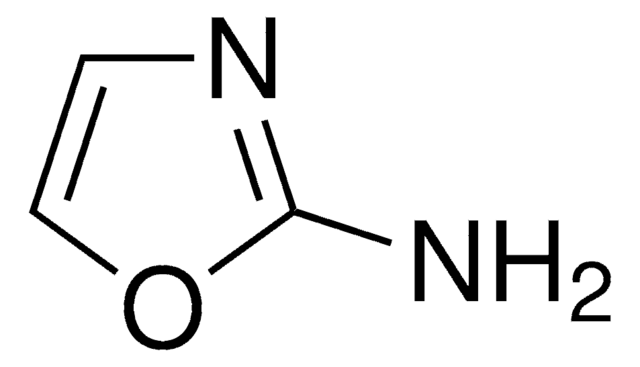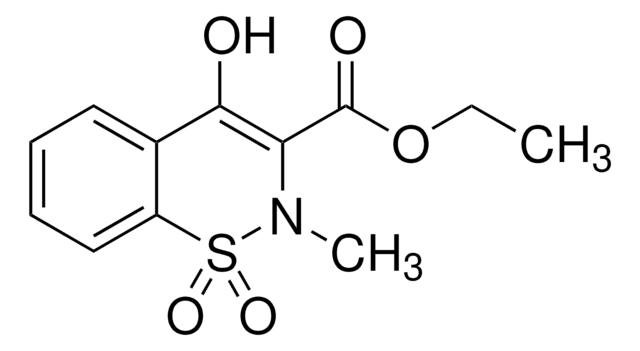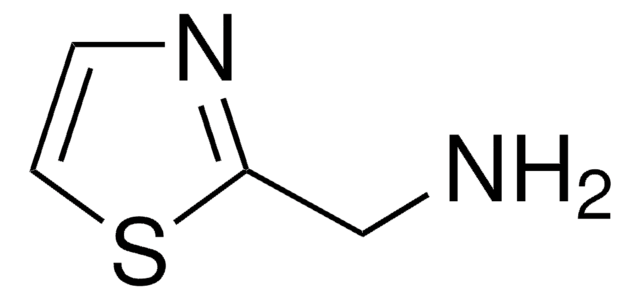All Photos(2)
About This Item
Empirical Formula (Hill Notation):
C4H6N2S
CAS Number:
Molecular Weight:
114.17
Beilstein:
109603
MDL number:
UNSPSC Code:
12352100
PubChem Substance ID:
NACRES:
NA.22
Recommended Products
Quality Level
Assay
98%
form
powder
mp
93-98 °C (lit.)
SMILES string
Cc1cnc(N)s1
InChI
1S/C4H6N2S/c1-3-2-6-4(5)7-3/h2H,1H3,(H2,5,6)
InChI key
GUABFMPMKJGSBQ-UHFFFAOYSA-N
Looking for similar products? Visit Product Comparison Guide
General description
2-Amino-5-methylthiazole is a heterocyclic building block. It is one of the major alkaline metabolite of tenoxicam (TX) and meloxicam (MX).
Application
2-Amino-5-methylthiazole may be used in the preparation of acrylamide monomer, 5-methyl-2-thiozyl methacrylamide (MTMAAm).
2-Amino-5-methylthiazole may be used in the preparation of mixed-ligand dien-Cu(II) complexes (dien=diethylenetriamine). It may be used in the preparation of a new series of Schiff mono/dibase coordination compounds, having potential anticancer and antibacterial activities.
Signal Word
Warning
Hazard Statements
Precautionary Statements
Hazard Classifications
Acute Tox. 4 Oral - Aquatic Acute 1 - Aquatic Chronic 1 - STOT RE 2
Storage Class Code
11 - Combustible Solids
WGK
WGK 3
Flash Point(F)
Not applicable
Flash Point(C)
Not applicable
Personal Protective Equipment
dust mask type N95 (US), Eyeshields, Gloves
Choose from one of the most recent versions:
Already Own This Product?
Find documentation for the products that you have recently purchased in the Document Library.
Customers Also Viewed
Riccardo Baron et al.
Chemphyschem : a European journal of chemical physics and physical chemistry, 9(7), 983-988 (2008-04-18)
The binding of 2-amino-5-methylthiazole to the W191G cavity mutant of cytochrome c peroxidase is an ideal test case to investigate the entropic contribution to the binding free energy due to changes in receptor flexibility. The dynamic and thermodynamic role of
A Th Chaviara et al.
Journal of inorganic biochemistry, 98(8), 1271-1283 (2004-07-24)
A new series of coordination compounds of the starting materials [Cu(dienX(2)Y(2))] and their adducts [Cu(dienXXY(2))(2a-5mt)] (where dien=diethylenetriamine, dienXX=Schiff bases of diethylenetriamine with 2-furaldehyde or 2-thiophene-carboxaldehyde, X=O, S, Y=Cl, Br, NO(3) and 2a-5mt=2-amino-5-methylthiazole) were synthesized by stepwise reactions and their structures
A Th Chaviara et al.
Journal of inorganic biochemistry, 99(2), 467-476 (2004-12-29)
Two novel mononuclear Cu(II) coordination compounds of the type [Cu(dptaS)Cl(2)] and [Cu(dptaS)Br(2)] (dptaS=1,3-propanediamine, N(1)-[3-aminopropyl]-N(3)-[2-thienylmethylidene] or Schiff mono-base of dipropylenetriamine with 2-thiophene-carboxaldehyde) were prepared by the hydrolysis of the di-bases, [Cu(dptaSS)Cl(2)] and [Cu(dptaSS)Br(2)] (dptaSS=1,3-propanediamine, N(1)-[2-thienylmethylidene]-N(3)-[[2-thienylmethylidene]aminopropyl] or Schiff di-base of dipropylenetriamine with
E Pontiki et al.
Journal of enzyme inhibition and medicinal chemistry, 23(6), 1011-1017 (2008-11-14)
Highly reactive radicals are implicated in many pathological conditions. The quest for radical scavengers or antioxidants, spans the previous decades. A new series of complexes of the type [Cu (dien) (2a-2tzn) Y(2)] and [Cu (dienXXY(2)) (2a-5mt)] and of the type
Ratio derivative spectrophotometric method for the determination of some oxicams in presence of their alkaline degradation products.
Taha EA, et al.
Scientia Pharmaceutica, 71(4), 303-320 (2003)
Our team of scientists has experience in all areas of research including Life Science, Material Science, Chemical Synthesis, Chromatography, Analytical and many others.
Contact Technical Service













